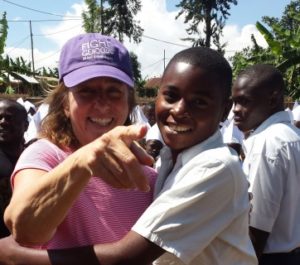We saw this firsthand, as we began our day at Panzi Hospital. JWW supports a program at the hospital that assists rape survivors who — as a result of the crimes committed against them — have been stigmatized by their families and villages, and prevented from returning home. Our project trains the survivors to learn a skill that allows them to make money and live independently, often with the baby born out of their rape. The program also provides literacy classes and psycho-social assistance.
After visiting the hospital, we went to the village of Momushu, where we run several educational projects and support a home for teens made pregnant by rape. They have nowhere else to go.
In Momushu, we met a 15-year-old girl who was raped last fall by someone from the next village. Her parents, both schoolteachers, are loving and supportive; unlike some of her peers’ parents, they did not abandon her. But the girl was so traumatized that she decided to commit suicide by ingesting poison. Her parents found her and immediately took her to Panzi hospital to try and revive her.
At Panzi, they met Dr. Mukwege — a very famous fistula repair surgeon who started a hospital for rape victims in Bukavu. He performed a very delicate surgery, removing the pieces of her organs destroyed by poison. He saved her life.
She spent three months at Panzi and then returned to Momoshu. She is slowly recovering and has gone back to school. Our group had a private meeting with this girl and her mother today. She seemed very depressed, almost lacking affect. During our short meeting, we encouraged her. Naama, JWW’s Assistant Director, took a bracelet out of her pocket that her mother had given her as a good luck charm for the trip. She gave it to the young woman as a token of good luck and safety. We all burst into tears, as the young woman accepted the bracelet and a hug from Naama. She flashed a broad smile and hugged each of us. It was powerfully moving for our entire group to see that this young woman — carrying such pain — was still able to smile, if only for a moment. Thank you Naama.
Later, we met with 50 high school students in Momoshu, most of whom have lost one or both of their parents in the conflicts here. JWW pays their high school tuition. Without outside support, they would not be able to receive a secondary education. Several of them want to go to college. We have asked our partner here for a grant proposal so that we can consider giving the top students college scholarships.
Over the years of coming here, I’ve learned that to be successful in Congo, it’s important to understand the cultural context, recognize the obstacles — and have realistic expectations. To be sure, systemic change in Congo will be slow.
Yet, the slow pace of change cannot discourage us. We must be satisfied with the chance to help individuals who are suffering. Meeting these people, I cannot help but feel enormously grateful for the opportunity to do something to help. Whenever anyone complains that we are just offering band-aid solutions, I ask them to put themselves in the place of the mother of a rape victim — surely any one of us would feel grateful, indeed willing to beg, for the type of help we can and do provide.
Everything we do here is HEAVY. Our very reason to be here, and I would argue the only reason any foreign interest should be here, is to offer assistance and support as directed by the community to the people who have been so blatantly brutalized and abused. And that is exactly what we are doing.
I cannot tell you how coming here makes me feel blessed beyond words. Blessed to have been born where I was born and to whom I was born. We are truly the luckiest people in the world. It is hard to understand that fully until you have been to a place like Eastern DRC.
Janice Kamenir-Reznik is the Co-Founder and President of Jewish World Watch. This post also appears in The Jewish World Watch Blog: One Life at a Time, hosted by the Jewish Journal, and Janice Kamenir-Reznik’s blog, hosted by The Huffington Post.


